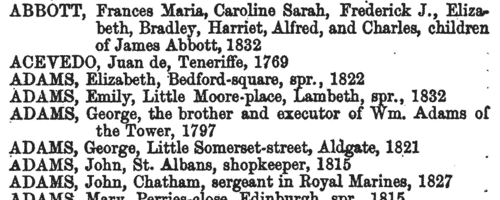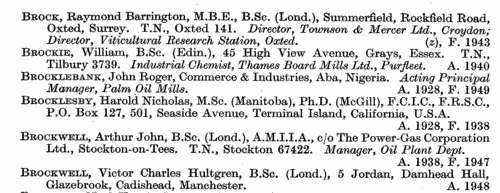Cheeseworth Surname Ancestry ResultsOur indexes 1000-1999 include entries for the spelling 'cheeseworth'. In the period you have requested, we have the following 4 records (displaying 1 to 4): Buy all | | | Get all 4 records to view, to save and print for £22.00 |
These sample scans are from the original record. You will get scans of the full pages or articles where the surname you searched for has been found. Your web browser may prevent the sample windows from opening; in this case please change your browser settings to allow pop-up windows from this site. Merchant Seamen (1835-1844)
At this period, the foreign trade of ships plying to and from the British isles involved about 150,000 men on 15,000 ships; and the coasting trade about a quarter as many more. A large proportion of the seamen on these ships were British subjects, and so liable to be pressed for service in the Royal Navy; but there was no general register by which to identify them, so in 1835 parliament passed a Merchant Seamen's Registration Bill. Under this act a large register of British seamen was compiled, based on ships' crew lists gathered in British and Irish ports, and passed up to the registry in London. A parliamentary committee decided that the system devised did not answer the original problem, and the register was abandoned after less than two years: the system was then restarted in this form, with a systematic attempt to attribute the seamen's (ticket) numbers, and to record successive voyages. The register records the number assigned to each man; his name; age; birthplace; quality (S = seaman, &c.); and the name and official number of his ship, with the date of the crew list (usually at the end of a voyage). Most of the men recorded were born in the British Isles, but not all. The system was still very cumbersome, because the names were amassed merely under the first two letters of surname; an attempt was made to separate out namesakes by giving the first instance of a name (a), the second (b), and so on. In this volume the register is restarted from 1840 onwards, with the mariner's previous number (if any) being entered in the column after his birthplace. In the event of it becoming known that a man had died during the course of a voyage, that information is written across the remaining empty columns. This volume (BT 112/12) covers mariners whose surnames start with Ce (and McCe), Ch (and McCh) and a handful with Ci.
CHEESEWORTH. Cost: £8.00.  | Sample scan, click to enlarge

| New South Wales Intestates
(1857)
The probate courts of the Australian colonies furnished returns of estates of deceased intestates, giving full name, colonial residence, supposed British or foreign residence of family (often unknown, or left blank), amount of the estate and how much had been disbursed and how. The date of death is often stated, and if by accident, suicide or crime. Names were carried forward from return to return until the estate was expended or exhausted. CHEESEWORTH. Cost: £6.00.  | Sample scan, click to enlarge

| De Bernardy's Unclaimed Money Register
(1883)
This register is divided into three parts, under these headings:
1. 'Unclaimed Money. The following persons, or their representatives, are entitled to property'. This is the part covered by this index.
2. 'Australia. Unclaimed Money. The following persons, who went to Australia, if alive, or if dead their representatives, are entitled to property'. Australia is here understood to include New Zealand.
3. 'America. Unclaimed Money. The following persons, who went to America, if alive, or, if dead, their representatives, are entitled to property'.
In each case there then follows a list of names, alphabetical by surname (in capitals), and some brief circumstantial details, usually with a year, mostly from 1810 onwards, but with a handful of earlier instances. Anyone thinking they might have a claim to one of these estates was invited to send full details to Messrs De Bernardy Brothers, 28, John-street, Bedford-row, London, to further their claim.CHEESEWORTH. Cost: £4.00.  | Sample scan, click to enlarge

| Chemists
(1950)
The Royal Institute of Chemistry was founded in 1877, and was open only to British subjects (and also, in due course, to citizens of the newly-created Republic of Ireland). Associates of the institute (A. R. I. C.) qualified either by studying chemistry, physics, mathematics and an optional science for the institute's examination (which insisted on a high standard of practical laboratory efficiency); or by obtaining good honours degrees or equivalent qualifications, with chemistry as principal subject, and having undergone training in allied sciences. Associates of at least three years' standing could then be admitted to the Fellowship (F. R. I. C.) either by taking a further examination in a special branch of chemistry, or by submitting the results of work or evidence of experience sufficient to justify the Council in granting exemption from such further examination. This register of fellows and associates, correct to 31 August 1950, contains 11,545 names, arranged alphabetically, surname first (in capitals), with qualifications, current address, telephone number, and (in italics) a brief description of present post in the chemical industry. Finally, year of admission as associate (A.) (and, where appropriate, fellow (F.) is given on the right-hand side. With this may appear the notation (x) for a fellow of the Chemical Society, (y) for a member of the Society of Chemical Industry, or (z) for a joint subscriber to all three chartered bodies.CHEESEWORTH. Cost: £4.00.  | Sample scan, click to enlarge

|
Research your ancestry, family history, genealogy and one-name study by direct access to original records and archives indexed by surname.
|






